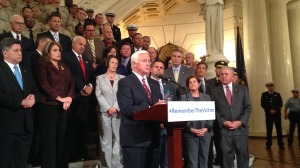ACLU vows lawsuit against PA legislation targeting offenders’ speech

By Andrew Staub | PA Independent
HARRISBURG, Pa. – State lawmakers fast-tracked legislation last week that would give victims the power to seek a civil injunction to silence their offenders if they believe their speech is re-victimizing them.
Now, even after sailing to Gov. Tom Corbett, who was expected to sign the bill Tuesday in Philadelphia, the legislation could get bogged down in court. Andy Hoover, legislative director for the American Civil Liberties Union of Pennsylvania, said the issue is “definitely going to litigation.”
“This bill is written so broadly that it is unclear what behavior is prohibited,” Reggie Shuford, executive director of the ACLU of Pennsylvania, said in a statement. “Essentially, any action by an inmate or former offender that could cause ‘mental anguish’ could be banned by a judge. That can’t pass constitutional muster under the First Amendment.”
CORBETT TO SIGN BILL: Pennsylvania Gov. Tom Corbett, who headlined a recent press conference calling for more protections for crime victims, is expected to sign legislation giving victims and prosecutors the power to silence offenders if the believe they are re-victimizing them.
While the wheels of the Legislature have a tendency to turn slowly, lawmakers smashed the pedal to the floor after convicted cop-killer Mumia Abu-Jamal – speaking from the prison where he is serving out a life sentence – delivered a recorded commencement address to a small group of students at Goddard College in Vermont.
The state Department of Corrections indicated it couldn’t stop the speech, but lawmakers quickly introduced legislation that would allow victims or prosecutors acting on their behalf to seek a civil injunction to stop conduct that could cause a “temporary or permanent state of mental anguish.”
The legislation also allows victims to seek “other appropriate relief, including reasonable attorney fees and other costs associated with litigation, for conduct which perpetuates the continuing effect of the crime on the victim.”
State Rep. Mike Vereb, a Montgomery County Republican and the driving force behind the legislation, didn’t immediately return a message seeking comment about the potential for a lawsuit, but said earlier this month the proposal had been vetted by attorneys.
“We feel that we’re not anywhere near treading on any First Amendment issues,” he said, indicating the proposal doesn’t aim to stop inmates from speaking with families or reporters, but rather to stop the “commercialization” of incarceration.
Jay Pagni, a spokesman for Corbett, declined to comment on the possibility of legal action, but said the bill would “provide victims of serious, heinous crimes a voice and make it abundantly clear that victims have rights, too.”
The ACLU noted that Abu-Jamal’s speech didn’t make mention of the 1981 slaying of Philadelphia police officer Daniel Faulkner.
Hoover added there’s “a complete lack of clarity” about what conduct is actually prohibited under the bill, leaving open the possibility the legislation could chill a wide variety of offenders’ speech, including articles prisoners write for a newsletter, interviews they conduct with media and even their testimony at legislative hearings.
The ACLU could file litigation in federal court within several weeks, Hoover said, adding he believes there’s an existing case that “dooms” the legislation. That happens to be the infamous Snyder v. Phelps, in which Albert Snyder, the father of a soldier killed in the Iraq War, sued Fred Phelps and his notorious Westboro Baptist Church after they picketed his son’s funeral.
While Snyder alleged the church inflicted intentional emotional distress, the U.S. Supreme Court ruled 8-1 in 2011 the First Amendment protected Westboro’s protest, which related to matters of public concern and occurred on public land next to a public street.
In that case, Snyder certainly had the moral high ground, but that didn’t usurp the church’s right to free speech, as awful as it was, Hoover said. Now, the ACLU lobbyist sees Pennsylvania lawmakers heading down the same road.
“In the Legislature, the lawmakers often confuse the moral high ground with the legal high ground,” Hoover said.
The bill passed 197-0 in the House, but met some resistance in the Senate, where it still cleared by a 37-11 margin.
The legislation replaced language in an existing Senate bill that would have allowed a victim of a crime or his or her family to testify before the Pennsylvania Board of Probation and Parole when the offender was being considered for parole. State Sen. Shirley Kitchen, D-Philadelphia, said “good” legislation was tainted by the addition and predicted it would be challenged.
“It was said that the champagne is already being brought out; people are already celebrating at the passage of this bill,” she said. “But this bill does not help victims. What it does is stifle free speech.”
Nevertheless, many lawmakers, law enforcement officials and victim advocates lauded the legislation as a significant tool that would give victims a stronger voice.
State Sen. John Rafferty, R-Montgomery, disagreed with Kitchen, arguing the legislation gives victims and their families the opportunity to have their say if they feel a perpetrator is receiving unwarranted attention. He stressed that a judge would ultimately decide whether to grant injunctive relief.
“The court will make that decision. Not the individual person, not the DA,” he said.
Hoover sees an element of political theater seeping into the legislation and hopes most judges will reject the request, even if it means hearing unpopular offenders voice their opinions.
“That’s why the First Amendment is there. If we only protected popular speech, we would not need the First Amendment,” he said. “The last thing we need is the government telling us who can and cannot speak.”
Andrew Staub is a reporter for PA Independent and can be reached at Andrew@PAIndependent.com. Follow @PAIndependent on Twitter for more.







